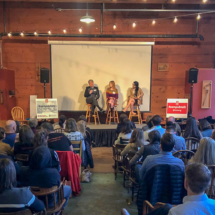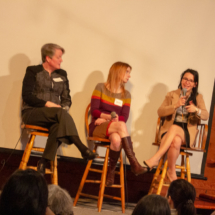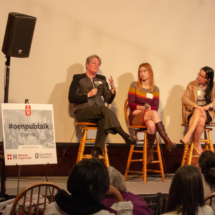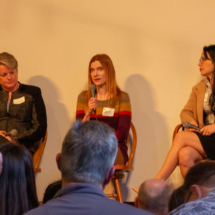
OEN News3 Takeaways from OEN’s March PubTalk: Ask the Attorney
At our March PubTalk, we heard from a great panel of attorneys representing a range of expertise from intellectual property (IP) and startups to labor and employment law. Our panel, moderated by Michael Phillips, Partner at Davis Wright Tremaine LLP, included Mary Hull, Partner at Stoel Rives LLP, Blerina Kotori, Partner at Tonkon Torp LLP, and Julie Reed, Partner at Miller Nash Graham & Dunn LLP. As Michael Phillips clarified to the audience, “unless you signed an engagement letter with one of these three people before you got here, these people are not your lawyers.”
Here are the top takeaways:
1. Beware common pitfalls
When you’re navigating the complexities of #startuplife, mistakes are bound to happen. And the attorneys on our panel have seen many of them. Here are a few tips. First, Blerina suggested entrepreneurs make sure to classify employees properly (are they technically a subcontractor or an employee?). Doing so can help your startup avoid substantial legal exposure. Second, don’t let “Finders” find you. Finders will help match you with an investor for a fee. Mary explained that aside from being “generally illegal”, clients who work with finders regret it, so steer clear. Finally, use TESS to search trademarks before launching your company and publishing your website. “Check beyond just the business registries,” said Julie. “Do a search and make sure there’s nobody out there that has anything…you want to use before you launch your company.”
2. You are the decision maker, not your attorney
Attorneys can advise you on the practice of law, but they don’t run your business. When a client asked Blerina if a business idea would make money, she answered, “I have no idea” because her expertise is in law, not business. Julie told the audience of a client that said, “just tell me what to do.” She couldn’t, of course, because it’s the client’s decision to make. The panelists agreed that startups shouldn’t worry about what a lawyer thinks of their business idea. “We’re lawyers, not business people,” said Blerina. When it comes to running your business, lawyers are advisors, not decision makers.
3. The Ins and Outs of NDAs
A non-disclosure agreement (NDA) obligates participants (founders and VCs, for example) to keep sensitive information confidential and can serve entrepreneurs in important ways. NDAs are recommended when working with independent contractors and consultants. Mary went on to explain that “NDAs have a great use if you’re considering a strategic partnership with some other company.” In this situation, both parties exchange sensitive information they want to keep confidential. Said Mary, “that’s where a startup is mostly going to use it, when they’re talking to potential strategic partners or maybe they’re thinking of a licensing agreement.” Julie added that NDAs cover not only technical info but also financial info and employee rosters.
See photos and watch the video from the evening below.




